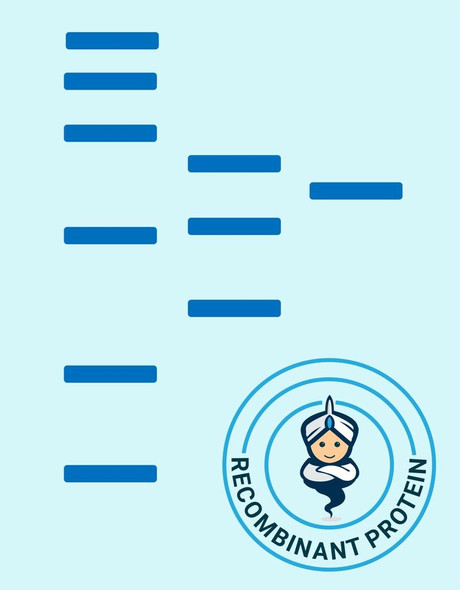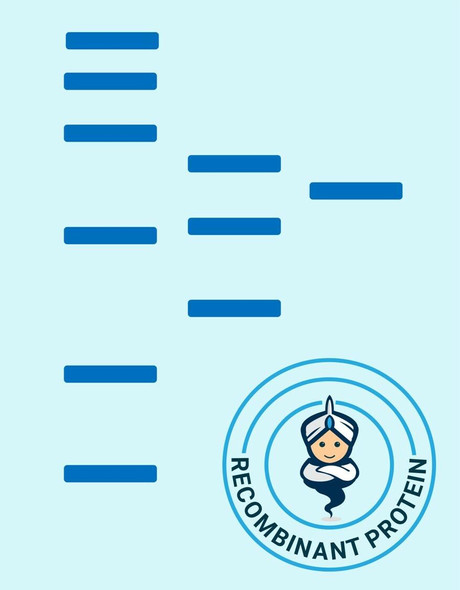Description
| Product Name: | Human VHL Recombinant Protein |
| Product Code: | RPPB5931 |
| Size: | 50µg |
| Species: | Human |
| Target: | VHL |
| Synonyms: | Von Hippel-Lindau disease tumor suppressor, pVHL, Protein G7, VHL, RCA1, VHL1, HRCA1. |
| Source: | Escherichia Coli |
| Physical Appearance: | Sterile filtered colorless solution. |
| Formulation: | The Von Hippel-Lindau Protein contains 1x PBS pH-7.4, 2mM EDTA, and 1mM DTT. |
| Stability: | Store at 4°C if entire vial will be used within 2-4 weeks. Store, frozen at -20°C for longer periods of time. For long term storage it is recommended to add a carrier protein (0.1% HSA or BSA). Avoid multiple freeze-thaw cycles. |
| Purity: | Greater than 95.0% as determined by SDS-PAGE. |
| Amino Acid Sequence: | MGSSHHHHHH SSGLVPRGSH�MPRRAENWDE AEVGAEEAGV EEYGPEEDGG EESGAEESGPEESGPEELGA EEEMEAGRPR PVLRSVNSRE PSQVIFCNRS PRVVLPVWLN FDGEPQPYPT LPPGTGRRIH SYRGHLWLFR DAGTHDGLLV NQTELFVPSL NVDGQPIFAN ITLP |
Von Hippel-Lindau disease is a dominant inherited syndrome characterized by the predisposition to develop various kinds of benign and malignant tumors, including clear cell renal carcinomas, pheochromocytomas and hemangioblastomas of the central nervous system and retina. VHL syndrome is caused by germline mutation in the VHL tumor suppressor, and VHL tumors are associated with loss or mutation of the remaining wild-type allele. VHL has two domains: a roughly 100-residue NH2-terminal domain rich in b sheet (b-domain) and a smaller a-helical domain (a-domain), held together by two linkers and a polar interface. VHL protein is also involved in the degradation of hypoxia-inducible factor (HIF).
Recombinant Human Von Hippel-Lindau Protein b-domain produced in E.Coli is a single, non-glycosylated polypeptide chain containing 174 amino acids (1-154) & having a molecular mass of 19.2 kDa. The Von Hippel-Lindau antigen is fused to 20 amino acid His-Tag at N-terminus and purified by proprietary chromatography techniques.
| UniProt Protein Function: | VHL: Involved in the ubiquitination and subsequent proteasomal degradation via the von Hippel-Lindau ubiquitination complex. Seems to act as target recruitment subunit in the E3 ubiquitin ligase complex and recruits hydroxylated hypoxia- inducible factor (HIF) under normoxic conditions. Involved in transcriptional repression through interaction with HIF1A, HIF1AN and histone deacetylases. Ubiquitinates, in an oxygen-responsive manner, ADRB2. Component of the VCB (VHL-Elongin BC-CUL2) complex; this complex acts as a ubiquitin-ligase E3 and directs proteasome- dependent degradation of targeted proteins. Interacts with CUL2; this interaction is dependent on the integrity of the trimeric VBC complex. Interacts (via the beta domain) with HIF1A (via the NTAD domain); this interaction mediates degradation of HIF1A in normoxia and, in hypoxia, prevents ubiqitination and degradation of HIF1A by mediating hypoxia-induced translocation to the nucleus, a process which requires a hypoxia-dependent regulatory signal. Interacts with ADRB2; the interaction, in normoxia, is dependent on hydroxylation of ADRB2 and the subsequent VCB- mediated ubiquitination and degradation of ADRB2. Under hypoxia, hydroxylation, interaction with VHL, ubiquitination and subsequent degradation of ADRB2 are dramatically decreased. Interacts with RNF139, USP33 and PHF17. Found in a complex composed of LIMD1, VHL, EGLN1/PHD2, TCEB2 AND CUL2. Isoform 1 and isoform 3 interact with LIMD1 (via LIM zinc-binding 2), AJUBA (via LIM domains) and WTIP (via LIM domains). Interacts with EPAS1. Expressed in the adult and fetal brain and kidney. 3 isoforms of the human protein are produced by alternative splicing. |
| UniProt Protein Details: | Protein type:Ubiquitin ligase; Tumor suppressor Chromosomal Location of Human Ortholog: 3p25.3 Cellular Component: nucleoplasm; intermediate filament cytoskeleton; mitochondrion; membrane; endoplasmic reticulum; cytosol; nucleus Molecular Function:protein binding; enzyme binding; ubiquitin-protein ligase activity; transcription factor binding Biological Process: negative regulation of cell proliferation; regulation of transcription, DNA-dependent; protein stabilization; positive regulation of transcription, DNA-dependent; cell morphogenesis; protein ubiquitination; negative regulation of transcription from RNA polymerase II promoter; proteolysis; positive regulation of cell differentiation; negative regulation of apoptosis Disease: Erythrocytosis, Familial, 2; Von Hippel-lindau Syndrome; Renal Cell Carcinoma, Nonpapillary; Pheochromocytoma |
| NCBI Summary: | Von Hippel-Lindau syndrome (VHL) is a dominantly inherited familial cancer syndrome predisposing to a variety of malignant and benign tumors. A germline mutation of this gene is the basis of familial inheritance of VHL syndrome. The protein encoded by this gene is a component of the protein complex that includes elongin B, elongin C, and cullin-2, and possesses ubiquitin ligase E3 activity. This protein is involved in the ubiquitination and degradation of hypoxia-inducible-factor (HIF), which is a transcription factor that plays a central role in the regulation of gene expression by oxygen. RNA polymerase II subunit POLR2G/RPB7 is also reported to be a target of this protein. Alternatively spliced transcript variants encoding distinct isoforms have been observed. [provided by RefSeq, Jul 2008] |
| UniProt Code: | P40337 |
| NCBI GenInfo Identifier: | 4033778 |
| NCBI Gene ID: | 7428 |
| NCBI Accession: | P40337.2 |
| UniProt Secondary Accession: | P40337,Q13599, Q6PDA9, B2RE45, |
| UniProt Related Accession: | P40337 |
| Molecular Weight: | Calculated: 18kDa/19kDa/24kDaObserved: 24kDa |
| NCBI Full Name: | Von Hippel-Lindau disease tumor suppressor |
| NCBI Synonym Full Names: | von Hippel-Lindau tumor suppressor, E3 ubiquitin protein ligase |
| NCBI Official Symbol: | VHL�� |
| NCBI Official Synonym Symbols: | RCA1; VHL1; pVHL; HRCA1�� |
| NCBI Protein Information: | von Hippel-Lindau disease tumor suppressor; protein G7; elongin binding protein |
| UniProt Protein Name: | Von Hippel-Lindau disease tumor suppressor |
| UniProt Synonym Protein Names: | Protein G7; pVHL |
| Protein Family: | Von Hippel-Lindau disease tumor suppressor |
| UniProt Gene Name: | VHL�� |
| UniProt Entry Name: | VHL_HUMAN |






